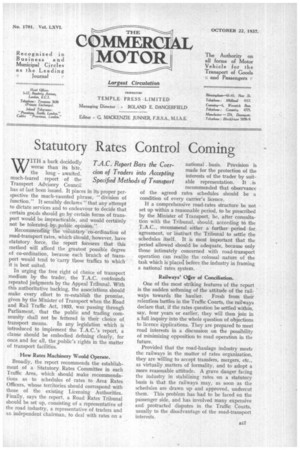Statutory Rates Control Coming
Page 51

If you've noticed an error in this article please click here to report it so we can fix it.
WITH a bark decidedly worse than its bite, the long awaited, much-feared report of the Transport Advisory Council has at last been issued. It places in its proper perspective the much-vaunted phrase, "division of function." It sensibly declares " that any attempt to dictate services and to endeavour to decide that certain goods should go by certain forms of transport would be impracticable, and would certainly not be tolerated by public .opinion."
Recommending the voluntary 'co-ordination of road-transport rates, which should, however, have statutory force, the report foresees that this method will afford the greatest possible degree of co-ordination, because each branch of transport would tend to -carry those traffics to which it is best suited.
In urging the free right of choice of transport medium by the trader, the T.A.C. confounds repeated judgments by the Appeal Tribunal. With this authoritative backing, the associations should make every effort to re-establish the promise, given by the Minister of Transport when the Road and Rail Traffic Act, 1933, was passing through Parliament, that the public and trading community shall not be fettered in their choice of transport means. In any legislation which is introduced to implement the T.A.C.'s report, a clause should be embodied defining clearly, for once and for all, the public's rights in the matter of transport facilities.
How Rates Machinery Would Operate.
Broadly, the report recommends the establishment of a Statutory Rates Committee in each Traffic Area, which should make recommendations as to schedules of rates to Area Rates Officers, whose territories should correspond with those of the existing Licensing Authorities. Finally, says the report, a Road Rates Tribunal should be set up, consisting of a representative of the road industry, a representative of traders and an independent chairman, to deal with rates on a national. basis. Provision is made for the protection of the interests of the trader by suitable representation. It is recommended that observance rates schedules should be a of the agreed condition of every carrier's licence.
If a comprehensive road-rates structure be not set up within a reasonable period, to be prescribed by the Minister of Transport, he, after consultation with the Tribunal, should, according V) the T.A.C., recommend either a further period for agreement, or instruct the Tribunal to settle the schedules itself. It is most important that the period allowed should be adequate, because only those intimately concerned with road-transport operation can realite the colossal nature of the task which is placed before the industry in framing a national rates system.
Railways' Oiler of Conciliation.
One of the most striking features of the report is the sudden softening of the attitude of the rail ways towards the haulier. Fresh from their relentless battles in the Traffic Courts, the railways declare that, if the rates question be settled within, say, four years or earlier, they will then join in a full inquiry into the whole question of objections to licence applications. They are prepared to meet road interests in a discussion on the possibility of minimizing opposition to road operation in the future. Provided that the road-haulage industry meets the railways in the matter of rates organization, they are willing to accept transfers, mergers, etc., as virtually matters of formality, and to adopt a more reasonable attitude. A grave danger facing the industry in stabilizing rates on a statutory basis is that the railways may, as soon as the schedules are drawn up and approved, undercut them. This problem has had to be faced on the passenger side, and has involved many expensive and protracted disputes in the Traffic Courts, usually to the disadvantage of the road-transport interests.
























































































































